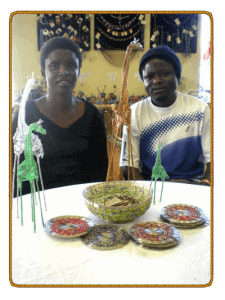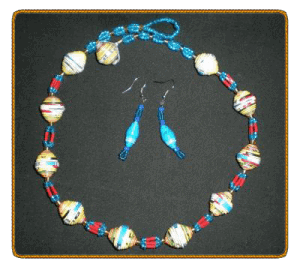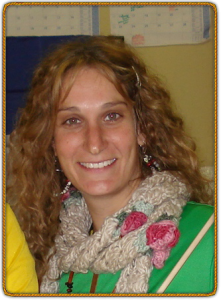Wadzanai
An Accidental Artist
Wadzanai wrapped in beaded wedding blanket.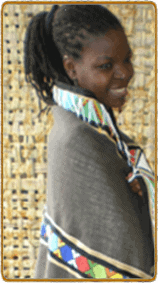
Wadzanai Bello has the Midas touch! Any material she touches from beadwork to fabric to recycled materials is transformed into exquisite handwork. She absorbs instructions like a sponge, mastering techniques and surpassing designers’ expectations with her skilled insight.
‘The first day she used a sewing machine , she sewed a simple felt stocking. The next day she returned with a bag, expertly sewn up in a morning Any trace of apprehension, question or self doubt, is masterfully concealed in her calm, friendly, patient demeanor.
However, this is not all that she conceals. Beneath her sparkling smile and stillness, lie deep wounds of her life circumstances.
Growing up in Harare, Zimbabwe was not easy and as the socio-economic climate deteriorated so too did her quality of life.
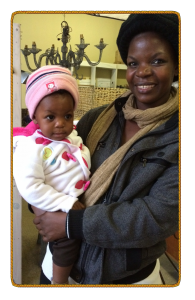 Wadzanai left school when she was 16 while grappling with abandonment by the men in her life. Her father and mother separated leaving her mother to support Wadzanai , her sister and three brothers. Her boy friend left her when she was pregnant with her first child.
Wadzanai left school when she was 16 while grappling with abandonment by the men in her life. Her father and mother separated leaving her mother to support Wadzanai , her sister and three brothers. Her boy friend left her when she was pregnant with her first child.
In Zimbabwe Wadzanai worked as a waitress until 2000, when no food,, jobs or money forced her to participate in other initiatives, like travelling to Mozambique to gather supplies to sell back home. At the tender age of 24 she risked her money and her health to buy and transport 50kg of food across borders. On many occasions, police corruption and social desperation could result in stock confiscation, leaving her with nothing for her efforts.
Wadzanai decided to leave Zimbabwe for South Africa in search of better prospects.
She arrived in Cape Town in 2007 and tells of her wonderful connection with Beth, a jewellery designer who took her under her wing .This was Wadzanai’s first taste the work of an artist and she thrived on it. Beth gave her comfortable
accommodation in her home and an abundance of creative training and regular beadwork. Although she never imagined that she would become an artist the techniques would just come naturally and she developed a feel for the way things look or the ways that colours worked together.
When Beth decided to move to Johannesburg, her world crumbled and her painful journey began.
Wadzanai’s young son Tinashe (meaning “god is with us”) was living with her mother in Zimbabwe until tragedy struck as Wadzanai’s mother died suddenly and unnecessarily of diabetes in June 2008 . The shocking conditions of healthcare in Zimbabwe meant that she was wrongly diagnosed with TB and treated accordingly but to no avail. Wadzanai didn’t even have money to go to the funeral.
2010 was an extremely difficult year, when at the height of a cold rainy Cape Town winter foreigners came under a Xenophobic attack. (a dislike or fear of foreigners that results in violence directed at the foreigners). Wadzanai was shunted from one residence to another, finding no peace. She initially stayed in an overcrowded dormitory room in Maitland, sometimes sharing with 30 people and even sleeping head to toe.
Next she moved to Khayelitsha only to have most of her possessions stolen during the “xenophobic” riots Then she moved back to Maitland until the police closed it down forcing her back to the townships. She was constantly harassed by people making demands on her.
Whilst living in a tiny room in the township her son then came to live with her and her fifteen year old sister also took refuge with her. These were massive responsibilities for a 28 year old woman!
Pleasant Surprises
Nevertheless, in 2009, she arrived at our African Home offices to present some of her jewellery and ended up joining our Creative Team by quietly and unassumingly, picking up a paint brush to assist in an urgent order, thus firmly establishing herself into our hearts. Wadzanai’s eagerness to work in-house means that she is always willing to experiment with new exciting products from Christmas angels, pixie boots and brooches to recycled bead and can curtains or milk carton bags. She is truly a gem in our crafter community chest.
Wadzanai is also a very good administrator and has soaked up office skills and manages our quality control as well as handles most of the packaging requirements for orders.
Most recently, Wadzanai has been enjoying happier times.
She gave birth to a delightful daughter just over a year ago. Baby Zoe is the light of her life and has also captured the hearts of all who have met her. Picture of Zoe
The bonds she has made with us at African Home have ensured that we take a special interest in her well being, doing all we can to celebrate her talent and dedication. We have been instrumental in finding her a new home, far safer, more comfortable and convenient than her previous dwellings. We helped Tinashe find placement in a good school and we have placed Zoe in a crèche across the road from African Home. Wadzanai has come into her own as a multi-talented craftswoman and we enjoy seeing orders come her way. After many months of product development and co-creation; the demand for Wadzanai’s fabulous creations continues to grow.
Victor
Victor’s Story
Victor Chiteura is proud to be called Zvakanaka, a term of endearment bestowed upon him by his crafter team.
Zvakanaka, means ‘maker of nice stuff’, a modest assessment of one whose reliability and attention to detail and quality places him ahead of his competition in the wireworks craft sector.
Victor is aware that in the craft industry as in all artistic endeavours, one needs to be innovative and efficient when designing a product.
No matter how big or small the order, he treats it with care, recognising that the smallest sample might lead to the biggest order.
He understands the great empowering potential of such orders and that through them, families can be supported and lives can change. He appreciates this concept, in light of his own personal journey and his struggles towards self preservation during times of immense hardship.
Victor was born in Zimbabwe in 1968. His was one of four children living in a family of abject poverty. His father died when he was ten, leaving his mother to fend for them in their rural home.
Victor left school in Grade 8 in order to find and provide financial support for his family. He moved to the city when he was 16, selling cigarettes and constantly job hunting despite scarce resources eventually reaching his lowest point in his early twenties. He lived alone on the streets for two years, selling vegetables to survive.
 Today, he feels blessed by his wife Precious, their 10 year old son Loyiso , 4 year old Blessing and an abundance of friends and “cousin-brothers”.
Today, he feels blessed by his wife Precious, their 10 year old son Loyiso , 4 year old Blessing and an abundance of friends and “cousin-brothers”.
It was during his period of extreme poverty in 1990, that Victor began to teach himself craft. He set himself a goal and in 1993, after his mother’s death, he managed to save money to buy a Zimbabwean passport, craft materials and pay for his travel costs to South Africa.
He lived in Durban before settling in Port Elizabeth (PE)in 1995 where he met Precious. Victor remembers these years as fruitful. He would spend two to three months in Zimbabwe producing enough stock of wire motorbikes to take with him back to PE, where he would sell all his stock within less than a month.
However, misfortune struck when Victor first experienced the effects of Xenophobia. At one in the morning Victor fled his home with only the clothes he was wearing and minimal possessions after being robbed and threatened by certain jealous individuals.
In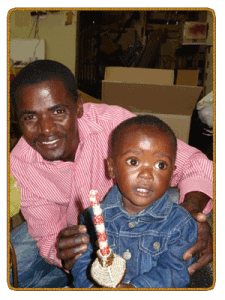 2004, Victor arrived in Cape Town and lived in Long Street where he worked for a pittance in the craft industry. Upon leaving this craft co-operative, Victor struggled to gain access to the right trade markets as his diligence and expertise made him a threat to his former employers in a highly competitive industry.
2004, Victor arrived in Cape Town and lived in Long Street where he worked for a pittance in the craft industry. Upon leaving this craft co-operative, Victor struggled to gain access to the right trade markets as his diligence and expertise made him a threat to his former employers in a highly competitive industry.
In 2007, Victor came to us for the first time and started working on various orders. Victor’s collaboration with African Home has opened up a world of opportunity for him. He has come to recognise his rights as a crafter and the values of fair trade that contrast with previous models of exploitation. His dedication to our initiatives, rewards us with his high quality and reliability and him with wholesale orders and professional skills development.
“Attention to detail and quality places him ahead of the competition”
Victor’s first order from African Home was his beaded frogs and fridge magnets. He was able to deliver this order a week earlier than expected. This is an impressive achievement in an industry where crafters sometimes work through the night to meet stressful deadlines. (Victor has known many of these!) Victor ‘s talent has meant that he has become one of the main crafters supplying our major US customer “ Ten Thousand Villages”. He is delighted by the support of this well established organization,
and the opportunity to be working consistently on their large orders. Since joining African Home in 2007, Victor has had a relatively constant flow of work and has bought a car and moved into a better house, with our assistance. This has made a great difference to his work productivity and expedience.
Victors’ taste of success did not guarantee plain sailing for him and his community. The Xenophobic attacks of 2009 throughout South Africa was yet another low point for him and his n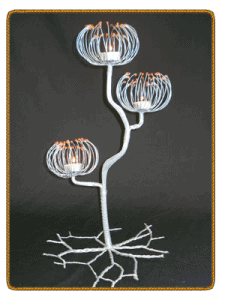 ow established team. Once again his home was invaded and vandalised and this time, his materials stolen and a large part of his finished crafts destroyed. Almost concurrently, he also endured various family bereavements as well as the unforeseen expenses that followed.
ow established team. Once again his home was invaded and vandalised and this time, his materials stolen and a large part of his finished crafts destroyed. Almost concurrently, he also endured various family bereavements as well as the unforeseen expenses that followed.
He was quite overwhelmed however by the generosity of a donation by Ten Thousand Villages ,who took to heart his plight and helped him get back on his feet. On another occasion , Victor fell extremely ill. With African Home’s support, he was able to get the best health care possible and we are delighted to note he is now in peak health . Despite the low ebbs in his life, Victor perseveres with his projects with the reassurance that he has an ever expanding support system holding him firmly in his endeavours. He is a cherished member of African Home.
Isaac
Chickens Crossing the Road to Success
The Eastern Cape is coloured with a Xhosa communities’ way of life. While Cape Town boasts a large population of Xhosa speaking city dwellers, Eastern Cape has been the traditional home base and heritage heart space for many.
Even the more developed urban areas like Queenstown have modern malls juxtaposed with informal markets. In its dusty streets, a local resident might be seen carrying an ATM bank card in one hand and a chicken in the other. This is the setting for Isaac Henry Mawethu’s story, his car load of ‘rainbow chickens’ are in fact his ticket to the bank, though in these times they are not going to the slaughter. They are bound for all sorts of destinations from Italy to Sweden…
A Rastafarian family man
Isaac stands tall with dreadlocks falling round his shoulders. His shy smile appears behind a field of festive fowl. He tells of his fond memories growing up with his ‘gogo’ (maternal grandmother) and two brothers in Queenstown. As was often the case in the difficult Apartheid climate, his mother spent much time working in Johannesburg, far away from her home base. The topic of his father is a source of pain for Isaac and a source of anger for his mother. He never knew his father and even though he subsequently found out further information of his whereabouts, Isaac claims little desire to acknowledge him.
Conversely, Isaac describes himself as a religious family man. He is a devout Rastafarian who is one of the earliest members of his spiritual community which was established in 1990. His strong identity serves him,  but also subjects him to discrimination.
but also subjects him to discrimination.
He says sadly: ‘People look at you. They assume you have no money. There is always prejudice on the taxis as people think you are on drugs. The police always harass you, calling you a drug dealer for dagga’.
Isaac’s consciously demarcated Rastafarian ‘village’ called Marcus Garvey is situated in the Phillipi township area. He claims it is at least 100 members strong and constantly growing. Initially his community stayed in Browns Farm near Nyanga in the 1980’s. However, there was a conflict of interests when ANC struggle activists living amidst them, undermined their anti war ideals and eventually forced them out of their establishment.
Forced uprooting was nothing new to Isaac who had spent much of his early teens and adulthood nomadically navigating in deeply difficult political times. He left school in 1982, at 14 years partly due to financial reasons and partly because of the dangers of schooling when education boycotters threatened those who persisted to study.
He moved to Cape Town with intentions of supporting his family financially despite his underage status. For 7 years, Isaac worked as a street vendor for The Cape Times. Payment was stable but icy early mornings and rainy days were major occupational health hazards. Then in 1991, a terrible car accident left him incapacitated with a broken arm and crippled him financially.
Six years of financial struggle followed but within this time were also hidden blessings and seeds of a new self empowered lifestyle. After his accident, Isaac took refuge with his mother in Johannesburg which he describes as a time when he really had a chance to get to know her. It was there that he was first exposed to his type of craft. Paper flowers made by a man from Ghana were the starting point for his experimentation. He had previously tried crafting with wire but his pained arm forced him to consider less strenuous craft techniques with different materials. Instead of paper, Isaac discovered recycled plastic as an abundance resource and chickens as colourful, quirky subjects.
His mother invested R1000 in his craft initiative and he has not looked back since. More plastic animals from giraffe to zebras have joined Isaac’s ‘plastic safari’ but chickens remain his bread and  butter.
butter.
Plastic, Problems and Patience
Isaac sheds light on the changing craft climate in South Africa. Sadly, as recycled resources become sought after materials, prices increase. Initially he used to get free off cuts otherwise discarded by recycling companies. However, now the Western Cape plastic industry is not so  obliging. There is more demand as his product has become popular and other crafters have copied it, competing with him in the cut throat industry. In many cases these crafters were his trainees whom he had empowered to assist him. They used to work together producing 500 top quality chickens a week. Now greed has divided his team and left him disillusioned encouraging him to dream further afield…
obliging. There is more demand as his product has become popular and other crafters have copied it, competing with him in the cut throat industry. In many cases these crafters were his trainees whom he had empowered to assist him. They used to work together producing 500 top quality chickens a week. Now greed has divided his team and left him disillusioned encouraging him to dream further afield…
Future Prospects: From Chickens to Cows
Isaac talks of the Eastern Cape with great affection. He is grateful for the impact that his plastic chickens have had on his life as he is able to reinvest in his traditional values. Buying Nguni cattle in the Eastern Cape is his long term investment towards returning to a more rural lifestyle. He also hopes to expand his business to the Eastern Cape, interacting with new plastic companies and empowering more people in dire need of skills and work. Isaac has been one of African Home’s longest associated crafters. He assures us that our connections shall endure beyond any social changes. Rainbow plastic animals seem to nod in agreement. They brighten up our showroom. They peer out of the window inviting onlookers chuckling as they consider: Why did the customer cross the road? To get to the chicken of course!
Dickson & Tendai
Partners in marriage and craft.
Dickson and Tendai have been together for over sixteen years and have three children, Godfrey (19), Gladmore (16) and Chido (9).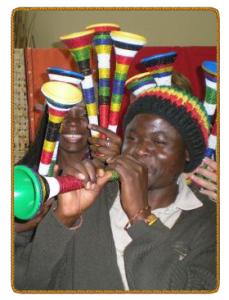
Dickson, now 39 years, grew up in Mutekedza, a small village in Zimbabwe (Zim). He met Tendai ( 36) while visiting his grandparents’ village. She had been living with her grandmother due to her parents’ separation.
As a teenage couple they had great hardship to endure. Initially, Dickson worked for a tobacco company and Tendai found part time work in a Beauty Salon, however, with Zimbabwe’s deteriorating political and economic climate, the tobacco company folded and work grew scarcer for both youngsters.
As a result, Dickson turned to craft, training under the guidance of a friend. Tendai gradually mastered various techniques to assist her husband.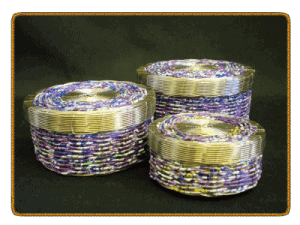
Working as a team has been vital for Dickson’s craft initiative. He complains that previously, he simply could not manage large orders alone but he couldn’t trust training others with his special techniques. His unique twisted tin can style grew out of an innovative approach to creating new designs in the market. The problem with being an innovator however, is that one is vulnerable to imitation and betrayal.
“I trained one guy to help me but the problem is that if I bring you a bowl for R15, he will come to you and sell it to you for R10”.
Nevertheless, the couple explain that they are optimistic about their lives in Cape Town, where they live with their youngest child. (Their other two boys remained in Zimbabwe.) “In Zim all things were hard. Life isn’t perfect here but compared to when we were in Zim, we have much more opportunity and we can give money home.”
Humble Dreams
Their greatest dream, entails sending money back to their homeland. Dickson longs to get a big order that would help him invest his money in land back home. He dreams of building a house and reuniting his family.
Tendai dreams of furthering her children’s dreams. She explains that in Zimbabwe, the current public schooling system is abysmal. Teachers are paid very little and therefore, a decent education can only be obtained by either paying these teachers extra for private lessons or affording private school tuition.
Their dreams are humble, their message to their clientele simple: Through African Home, they are excited to get international exposure. They want to the whole world to see the beauty and skill of their handicraft.
Since working with us, they have enjoyed various orders from beaded Vuvuzela’s (a beaded plastic horn, 65 centimeters or 2 feet in length, which pro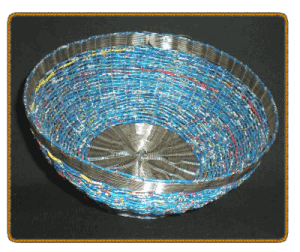 duces a long monotone sound. Traditionally made and inspired from a kudu horn, the Vuvuzela was used to summon distant villagers to attend community gatherings. Today, it is associated and used at football matches worldwide)
duces a long monotone sound. Traditionally made and inspired from a kudu horn, the Vuvuzela was used to summon distant villagers to attend community gatherings. Today, it is associated and used at football matches worldwide)
and customised fire place stands to twisted tin can bowls and jewellery boxes. We have also co-created new vibrant products such as tin can earrings, coasters and even an eco-conscious Zulu hat. We truly hope that with our support, Dickson and Tendai can have a whole world of opportunity in their hands.
Malvern
Malvern was born in 1971 in Harare , Zimbabwe , as the 4th of 5 sons he enjoyed a happy early childhood. However his family fortune changed dramatically and by the time he turned 14, his father 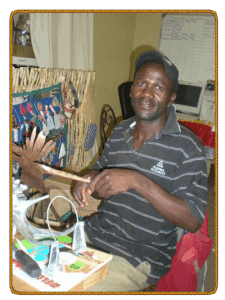 had died and his mother had lost her job leaving Malvern to step up to take the family burden onto his young shoulders.
had died and his mother had lost her job leaving Malvern to step up to take the family burden onto his young shoulders.
“Going to school was difficult. I had to school myself by selling vegetables and trying to do everything to survive.” Of the 5 sons, Malvern was the one to shoulder most of the support for his family . His oldest brother had his hands full providing for his own family, the second born was in college, the third had died from a sickness and the youngest was his dependant.
It was then that Malvern began his career in craft, sculpting wire motorbikes and helicopters to sell to tourists and across the border in South Africa. “All the money I got, I used to look after my 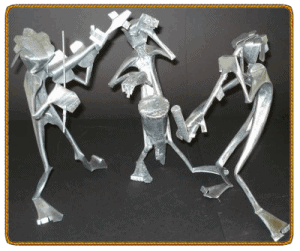 family.” he explains nobly.
family.” he explains nobly.
He then moved to South Africa in the hope of improving his income. Times were extremely difficult for Malvern as he was settling in Cape Town . Initially the odd jobs he obtained were exploitative of his desperation and hazardous to his health. Back home, his mother suffered a stroke and broke her leg. His wife and young sons were in Zimbabwe and he struggled to send them and his mother money.
However since joining African Home in 2009, Malvern has been able to bring his wife Deliwe and two sons aged 6 and 10 to live with him in Cape Town. Malvern is a special man with simple dreams.“I’m not after big things. The most that I want is to live a normal life and give my family food. “
Malvern also dreamed of becoming a musician in a band . Unfortunately a lack of funding meant that this dream was never realized however its expression has found form in some of his sculptures. The bottle cap musicians created for “Ten Thousand Villages” represent this aspiration .
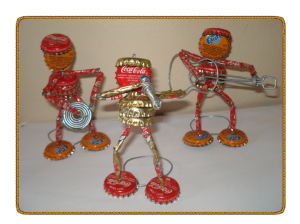 We appreciate Malvern’s humble but dependable nature, special creative ingenuity and versatile skills, making him a treasured member of our African Home team. His diverse talents enable him to sculpt magnificent metal musicians and other human forms out of a range of materials including bottle caps, wire, beadwork, recycled tin cans and recycled plastic.
We appreciate Malvern’s humble but dependable nature, special creative ingenuity and versatile skills, making him a treasured member of our African Home team. His diverse talents enable him to sculpt magnificent metal musicians and other human forms out of a range of materials including bottle caps, wire, beadwork, recycled tin cans and recycled plastic.
We are inspired by his hard and serious work ethic. He is driven by his sense of family responsibility and a determination to transcend his plight. As he explains, “ I’m very serious about my job. I like my job. If I have the opportunity to get a plot in Zimbabwe , it’s my greatest dream to build my own home and to get to pay it off.”
It is our mission to have Malvern actualize his dreams.
George
George Magaso – Master Beadsmith.
George has a mischievous twinkle in his eye and a jaunty step that belie the guise of a master craftsman. Not one to boast , he is aware that the quality of his work is better than most. He is a self made man having learnt his skill through his 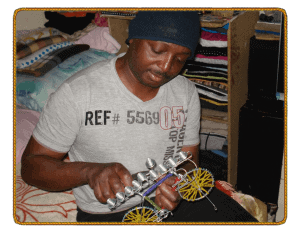 determined approach to life..
determined approach to life..
George was born on the 15th of March 1969, in Harare, Zimbabwe. There he attended school as a child along with his seven siblings. George was 13 years old when he began to make and sell wire cars in order to be able to earn some money to buy some clothes for himself. He also made these cars for himself and as toys for his siblings which they played with after school every day.
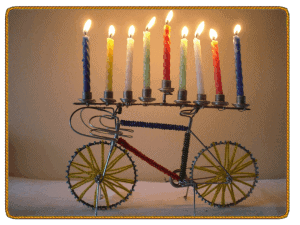 In 1992, at the age of 23, an unemployed George left Zimbabwe to come to South Africa. He noticed that quite a few of his fellow countrymen were venturing to South Africa to sell wire products, so this particular opportunity was a major influencing factor in his relocation. However, George found that selling his products in South Africa was not always easy. From time to time, he would produce his work and then find that he was not paid as much as he was initially promised. It was frustrating for him to put in such hard work and have nothing to show for it. George knew he had a talent in his chosen art form, thus he kept trying and refused to give up.
In 1992, at the age of 23, an unemployed George left Zimbabwe to come to South Africa. He noticed that quite a few of his fellow countrymen were venturing to South Africa to sell wire products, so this particular opportunity was a major influencing factor in his relocation. However, George found that selling his products in South Africa was not always easy. From time to time, he would produce his work and then find that he was not paid as much as he was initially promised. It was frustrating for him to put in such hard work and have nothing to show for it. George knew he had a talent in his chosen art form, thus he kept trying and refused to give up.
George was married in 1995 to Memory who is also from Harare, Zimbabwe. The happy couple have four children together. Their eldest daughter is now 17 years old, and the twins (a boy and a girl) are now 12 years old. These three children currently reside in Zimbabwe under the care of George’s in-laws. Their youngest son of 7 years lives with them in the township called Joe Slovo, located in Milnerton, Cape Town.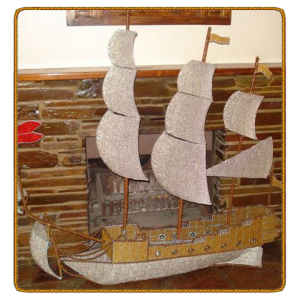
George is self taught in the art form that he pursues on a daily basis. He started working with beads and wire in 2000 which was a progression from his previous work in wire alone . He strives continuously to improve his talent and learn new skills .
He is also a team player in many ways, and so would help other craftsmen sell their products alongside his own during his stay in Johannesburg and Durban . Having found that he has a great talent for bead work, he has pursued and perfected this talent right up until the present day.
 In 2010, George came to Cape Town after a friend invited him to come and work with him at a wire work company. The opportunity seemed attractive at first, but George eventually decided to go back to working on his own from home.
In 2010, George came to Cape Town after a friend invited him to come and work with him at a wire work company. The opportunity seemed attractive at first, but George eventually decided to go back to working on his own from home.
As a family man, George prefers to work from home. This allows him to see his family more often, as travelling to various places takes up a lot of his time and energy out of his daily life. Staying at home, allows him to plan his own time schedule and may mean waking up at 3am in the 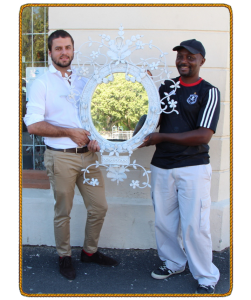 mornings to complete an urgent order.
mornings to complete an urgent order.
Currently, George has been completing some of African Home’s biggest projects and is a well respected crafter. He has made fine small Chinese ware vases , intricate Rococo style mirrors and wall sconces , cute USB Gigabugs as well as a range of Judaica products including a variety of Menorahs. His attention to detail and his ability to turn out high quality bead work set him apart as a master beadsmith. His talent is rare and he hopes that he can share it with more and more people in the future.
Innocent
Innocents smile and bearing exude a quiet confidence in his ability to create beautiful beaded pieces both small and large, simple or complex. He has the respect of his peers in that they recognize that he can guide them through difficult design work in the best possible way.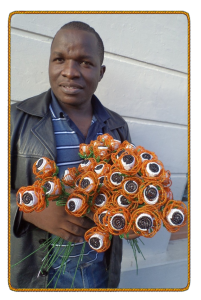
Born in Bulawayo, Zimbabwe in 1986 , he was the second youngest of 7 siblings. Whilst he enjoyed a happy childhood, there were constant financial difficulties since there were many mouths to feed in a poverty stricken economy. Innocent’s father died when he was 16 , and although his mother kept her job as an assistant in a boarding school, Innocent was unable to complete his education because of insufficient funds.
After leaving school ,Innocent worked as a gardener for 2 years and then as a temporary teacher in “building studies” at his old school.
Innocent came to Cape Town in 2008 in search of better earning possibilities . Whilst looking for other work he noticed that some of his countrymen were earning well from creating handcraft out of wire and beads. He was 22 years old when he decided to try his hand at beadwork and soon found that he had a talent for making a range of sculptures.
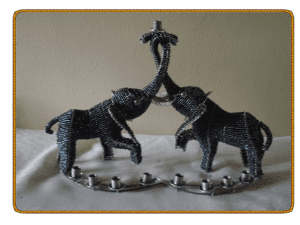 He started working for a company that produces handcraft and gained experience and an ability to work fast. He stayed in this position for 3 years but then in 2012, he decided to start working on his own since he wanted to initiate his own craft business and create crafts independently rather than simply follow instructions mechanically.
He started working for a company that produces handcraft and gained experience and an ability to work fast. He stayed in this position for 3 years but then in 2012, he decided to start working on his own since he wanted to initiate his own craft business and create crafts independently rather than simply follow instructions mechanically.
Innocent married Silungile in 2009, a girl from his home town, whom he taught to work with wire and beads . Silungile was soon helping him with his orders. They now have a 4 year old daughter who is currently being cared for by his mother in Zimbabwe.
He started working with us in July 2013 and we have found him to be not only a master craftsman, who has an eye for detail and can create any type of design, but also a respected teacher/ trainer. Large orders do not faze Innocent, since he gathers craftsmen together and quietly instructs them on the best way to tackle a project. His passion for teaching is infectious and many crafters are enriched through working with him .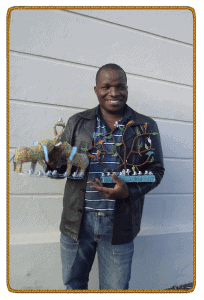
Since working with African Home he has been able to find better housing and has improved his earning capacity. Innocent specializes in wire and beadwork and has co-produced some life size animals like a rhino and a buffalo. He has also produced items out of recycled tin cans including radios, animals and cars.
His aspirations are to complete his matric and resume studying with the aim of returning to become a teacher of “building studies”.
He also hopes to be able to bring his daughter to live with him and his wife in Cape Town. African Home is committed to supporting Innocent to actualize these dreams.
Masiphulisane
 A Means to Tin Ends
A Means to Tin Ends
An awesome foursome walked into the showroom. Its members fill the space with their vibrant personalities and distinct characters. In fact, they seem to embody the various crafts that they have invented. Jane is their matriarch, just like their handmade blankets, she has patched together the group’s different members, enveloping them in the security of her age and
Rose has the practical business mind. She is reflected in the crocheted tin end bags and money purses that speak of both creativity and financial functionality. Nosimpiwe is the group’s bubbly spokesperson who, like her products’ ethnic ‘shwe shwe’ fabric trimming adds colour and vibrancy with a distinct blend of modern and traditional flavour. Nomalizo, a gentle, creative spirit is as charming as the dolls she creates.
From Rags to ‘Riches’ from Trash to Treasure
These four women make up Masiphuhlisane, a women’s empowerment group through craft. Their ideology is reflected in their Xhosa name which roughly translated means “development through gathering different resources together”. Such is the spirit of a contemporary South African culture that sees potential in what others might reject as impoverishment. Old broken clothing and rags are ideal for blanket pieces.
Unravelling woolen jerseys become dolls’ hair, broken pantyhose; their faces and discarded beverage tins are treasures that make
Since working with us at African Home, the latter product has now expanded to a range that includes vases lined with recycled plastic bottles and bottle bags finished with hints of ethnic textiles.
This spirit of “renewal” is what drives these ladies. They have had to re-new their own spirits, transcending the struggles of a heritage of discrimination and disadvantage. As Xhosa women from the Eastern Cape, they have lived through the height of Apartheid. They bore the injustices, enduring socio-economic hardships, raising children in the face of political upheaval and have still emerged as positive, motivated individuals with colourful dreams.

 At mature ages when most people desire retirement, Jane May and Rose Siyangoa charge full steam ahead. Jane is 61 and Rose 53. They both grew up in the Ciskei, an area that was previously considered a rural ‘homeland’ during Apartheid. The plight of many rural dwellers was to seek work in urban areas of the Eastern Cape and beyond since conditions made survival unsustainable. When Jane separated from her husband and had no support to enforce maintenance from him, her situation was desperate. She had to raise three children, pay school and hospital bills and was caught up in the bitter Apartheid cycle:
At mature ages when most people desire retirement, Jane May and Rose Siyangoa charge full steam ahead. Jane is 61 and Rose 53. They both grew up in the Ciskei, an area that was previously considered a rural ‘homeland’ during Apartheid. The plight of many rural dwellers was to seek work in urban areas of the Eastern Cape and beyond since conditions made survival unsustainable. When Jane separated from her husband and had no support to enforce maintenance from him, her situation was desperate. She had to raise three children, pay school and hospital bills and was caught up in the bitter Apartheid cycle:
No job reference meant no jobs but without a job one could not obtain a reference. She was forced to move constantly, from Elsie’s River to Crossroads and eventually to Khayelitsha where she still resides.
Rose worked as a domestic worker for seventeen years. Luckily, she established a stable consistent relationship with her employers but her heart ached for more. She knew she had great potential and business acumen and longed to realize much more than her work allowed. However, during Apartheid years the thought of taking such risks was unthinkable. She was bound by the prohibitive laws of the land. Eventually, her passionate dreams propelled her forward into the climate of ‘The New South Africa’. She enrolled in a business course and partnered with Jane on their road to self actualization.
Nosimpiwe, 39 and Nomalizo, 43 are cousins. With the change of government in 1994, more and more white families moved out of the Eastern Cape forcing many previously disadvantaged black people to follow them in search of jobs. Such was the case with Nosimpiwe who after completing school, could not afford to study further. She explains the hardships of moving to the Western Cape:
‘At first it was not good. You are all on your own. You use the train but you don’t know where you are going and it’s difficult to make friends. Some people think you are there to take their place. If you ask for work they say there is no job here because they think you come to take their job.’
However, Nosimpiwe’s warm personality and talent for networking helped her gather support around her and also helped her take advantage of a community handcraft sewing training course. Moreover, networking united her with Rose and further integrated Nomalizo into the group.
Nomalizo had been working as a domestic worker, first in Sea Point and later in Athlone. She was unhappy with her job, scraping together R50-R70 a day and knew that she had to shift something in her life. Her circumstances were far from her initial dreams of becoming a teacher. After school she had pursued such training but misfortune struck. In her final year, she became sick. She managed to pass all but one exam but could not go further. Now, in Cape Town, she knew that her education and skills should be put to greater use. With a hunger to apply her enquiring mind, she feasted on Nosimpiwe’s training, learning sewing and beadwork with the ideal that ‘everything we see, we like to do”. It was a risk to stop work and even though at times things are quiet, we keep our dreams alive.’
Time to drink a cup of tea
‘My age tells me to sit down and drink a cup of tea’ says Rose. This is her dream; to work from home and have a shop of her own so that Masiphuhlisane can become a more established organization. She can imagine a workspace and a showroom where they can work and still have leisure time to drink tea together. The ladies would prefer to have tour guides bring customers to their world so that people can see the context behind the project. They would like to establish relationships with regular customers, building their project as they build their name. Currently they sell their crafts in the market or on the street and complain that people do not take them seriously in this manner.
They would also like the local market to celebrate their crafts. They believe it is not only tourists who should support them and that instead of spending thousands of Rands on goods in shopping malls, locals should rather be proud of their products made in South Africa.
Star
Star Nsingo has a sparkle in her eyes, and a flicker of hope despite all that she has endured. This is her remarkable story…
Five years ago, Star’s life looked very different from what it is now. Today she lives in a small room in an informal settlement in Hout Bay, a suburban area of Cape Town. She does all that she can to put food on the table and support her children and their families. Her charming jewellery made from recycled paper and cardboard packaging is just one example of her ingenuity. She also taught herself homemade soap making, tailoring and knitting to name but a few of her skills.
Nevertheless, times are hard and she reminisces of how her life used to be.
Her own Personal Tsunami
Until December 2006, Star lived with her husband and three children in their ideal family home in Zimbabwe. They had a seven room home that they
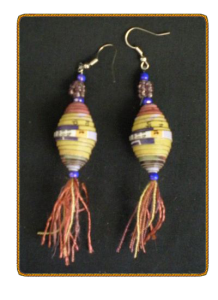 built on land that was allocated to them. While Star had trained as a professional bookbinder, she was also an expert in food gardening. The family enjoyed their maize and vegetable crops, sustaining themselves and selling their produce.
built on land that was allocated to them. While Star had trained as a professional bookbinder, she was also an expert in food gardening. The family enjoyed their maize and vegetable crops, sustaining themselves and selling their produce.
Then 8 December 2006, the same month as the international Tsunami tragedy, Zimbabwe’s morally corrupt government officials literally destroyed the foundations of her life. Through bureaucratic manipulation, they occupied her land and demolished her home. Less than a year later her husband died. Star attributes his death to his post eviction exposure to rains and poor conditions. However, she also suggests that the trauma of their experience is what really broke his spirit.
To add insult to injury, she was cheated out of her husband’s life insurance money and felt she had no choice but to flee her homeland seeking refuge with a friend in South Africa.
Star’s endurance is astounding. She has experienced so much hardship and injustice, yet her smile and spirit are filled with grace. She is proud of her craft and modestly explains how she learnt from simply observing others and experimenting with her own
Her face lights up with hope and delight when she talks of her skills and her dreams.
She longs to be growing her own food again in her own home. She complains that it’s impossible to develop such food production in her current meagre accommodation as “the dogs eat everything if you want to garden”. She is also realistic about the struggles of the fair trade craft world. She knows that she cannot compete with the mass produced cheap imported jewellery and clothing but tries to remain positive that there is a socially conscious market out there to support her enterprises.
We hope that through African Home, she will meet this clientele. We trust that she will discover people who celebrate her talent and her amazing strength; customers who can appreciate that when they wear a piece of her jewellery, they tell her story and bring her one step closer to that wish upon her star.
Claudette
Claudette: Owner of African Home
Claudette Davis is owner and CEO of African Home. From a background of research psychology, Claudette chose to change track completely and try her hand as an entrepreneur in the world of craft. With a deep interest in beautifully crafted handiwork she and Michal Leon started African Home in 2002. The basis for starting the company was the realization that many highly skilled crafters were unemployed because they lacked the markets to sell their crafts. Claudette manages the company but loves getting involved in the design process.
In the 12 years existence of African Home, she has personally worked with many crafters and witnessed the hardships that all experience in trying to eke out a daily subsistence. This humbling experience gives her the energy to pursue her goal of facilitating crafters to find enough work to pay for their daily needs. Whilst African Home has improved the lives of many people, it has not yet succeeded in lifting them out of their deep well of economic poverty. Claudette’s mission is to find enough orders for all crafters so that they will be able to afford more than the basic costs of breadline existence.
She is married to Dennis and has two children, a daughter who is a Candidate Attorney and a son who is studying for his Master of Social Science in Philosophy.
Peter
Peter’s Story
Dependable, resilient , versatile , patient,-are just a few of Peters many characteristics that mark him out as a leader and able manager. Peter s sales and marketing background stems from humble beginnings.
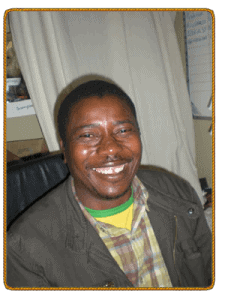 Peter was born in 1966 to migrant workers from Malawi who settled in Zimbabwe. He was the youngest of a family of 9 siblings .He attended primary school in rural Zimbabwe during the 1970s Rhodesian Bush War also called the Zimbabwe War of Liberation. Growing up in a large family made Peter tough and resourceful as he had to fight off his elder twin brothers who were about 3 years older . Because primary school was approximately 10 kilometres walking distance, Peter and his siblings had to leave home after curfew in the morning and return before sunset. Although many other children gave up school and joined the guerillas in Mozambique Peter’s parents emphasised that education was the future. As a result Peter picked up English, Shona and Chewa in his desire to become educated.
Peter was born in 1966 to migrant workers from Malawi who settled in Zimbabwe. He was the youngest of a family of 9 siblings .He attended primary school in rural Zimbabwe during the 1970s Rhodesian Bush War also called the Zimbabwe War of Liberation. Growing up in a large family made Peter tough and resourceful as he had to fight off his elder twin brothers who were about 3 years older . Because primary school was approximately 10 kilometres walking distance, Peter and his siblings had to leave home after curfew in the morning and return before sunset. Although many other children gave up school and joined the guerillas in Mozambique Peter’s parents emphasised that education was the future. As a result Peter picked up English, Shona and Chewa in his desire to become educated.
Peters memories of his early school days were very pleasant. “School was beautiful, playing soccer and running bare footed, making toys out of wire/clay, swimming in bilharzia invested rivers as well as imitating Bruce Lee in martial arts.” His mother would bake scones and send Peter to sell them at various events in order to supplement school fees as the salary earned by his father was insufficient. These early entrepreneurial activities sewed the seed for Peter to become a businessman. His mother discouraged him from playing with unruly characters, avoiding funerals (where one learnt activism from one’s peers) and visiting areas where people died during the war. Peter’s father was a committed Christian who held a family prayer meeting each night before the family went to sleep. Using his bible teachings, his father encouraged his children to become self reliant instead of depending on finding employment.His father referred to the exploitation he endured in the second world war with no benefits despite the risks to which they were exposed . Peter and his siblings attended these meetings out of respect for their father as everybody feared for the worst consequences.
Peter learned a number of skills from his father such as tailoring and carving wooden hoe and axe handles. Most of his siblings migrated to the city in search of employment or vocational education. The government declared that one should first go for national service to the Rhodesian army before getting employed but both parents discouraged their children from conscripting , praying that the war would end sooner. Sadly , his father passed away in 1978 at the height of the war but also close to cease fire in 1979. Peter could not continue school due to lack of funds and relocated to Harare where he took on various jobs to finance his further education through part time studies. He worked his way up from shop floor to management level in clothing and furniture manufacturing industries. He also worked for a German private tour operator and university lecturer who also became his mentor.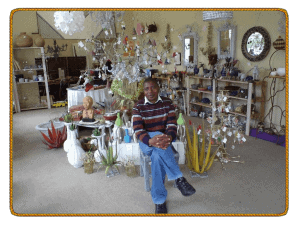
The influence of Peter’s father meant that the Church became an important focus in his life. Peter spent his spare time in Harare with elderly people at church as well as going to movies and soccer matches in the 1980s with those of his age. Choral music, long distance running and crafts became his favourite activities. His mother relocated to Malawi in the early 1980s where she passed away in 1987.
His passion for business activities was enhanced when the salary earned then was not enough to cater for his education. He subsidised extra funds by engaging in cross border trading going to Botswana, Mozambique and South Africa between the late 1980s and early 2000. Interactions with people from various cultures increased his knowledge of German, Afrikaans, Ndebele and Xhosa.
Peters zest for education saw him attain tertiary qualifications in Zimbabwe in Public relations, marketing and sales management (LCCI). In early 2000 he relocated to Cape Town and continued with part time studies at UWC (Advanced diploma in management) through the assistance and mentorship of the then chief economist of Wesgro, whilst pursuing a cross border trade in arts and crafts as well. After graduating at UWC in 2007, he was employed as a shop assistant at Noordhoek selling arts and crafts.
In 2009 he became the marketing manager at African Home. Peter believes that African Home has greatly enriched his career since he has had to learn to be proficient at multi- tasking. To this end he has become adept at moving between showroom management, product development, customer relations, following up on independent craftspeople to meet deadlines and attending to global clients via emails.
In 2011, Peter enrolled for a marketing diploma at CPUT and is looking forward to graduate in April 2015. His ambition is to graduate with an MBA. Peter is married to Loveness who lives with him in Cape Town . They have two boys Jurgen (18) and Todd (16) who stay in Zimbabwe. Peter always strives for self improvement and loves positive incremental changes in life’s journey on earth.
African Home has been very fortunate to have a person of his calibre as a trusted and valued staff member.
Terri
Teri Jedeikin worked for African Home for 3 years. She now lives in the USA with her husband Josh but retains her links with African Home offering design ideas for certain projects . She also continues to have an interest in the lives of the crafters and the ongoing welfare of African Home. She has written many of the crafters stories as well as much of the material for the website which reflect her compassion and belief in social outreach.
Whilst working at African Home, Teri enjoyed the opportunity to engage with crafters on a grassroots level, witnessing how creative skills can make a difference to so many lives. She was also a pivotal staff member engaging in many facets of management.


